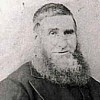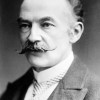Standing at the controls of his Somerset & Dorset train’s engine, driver Frank Cribb was tired. A Bournemouth man with sixteen years work experience on the railway, Cribb had been on duty since 5.10 a.m. that morning of Tuesday, 23rd December 1890, driving the engine of a regular Bournemouth to Bath service. Now he was approaching Broadstone station at 5.20 p.m., nearing the end of yet another return run from Bath and a gruelling shift of over twelve hours. The train’s engine, which was fitted with Westinghouse vacuum brakes, accordingly maintained a steady speed, and although noted for pulling into stations fast, had always stopped in time – at least, it always had up to then.
In the front carriage behind the engine’s tender, sisters Sarah and Elizabeth Worthington were sitting in a spirit of buoyant anticipation, looking forward to the days ahead. The two women were on their way to spend the festive season at the home of Edith Lowe, with whom they had become friends when Miss Lowe was teaching at a school in Birmingham; now she was living in Poole and in post as Principal of the town’s British Girl’s School.
The Worthingtons were nearing their destination after a journey in which they had travelled down from Birmingham to join the SWR line at Mangotsfield near Bristol; from here another engine took the Bournemouth carriages to Bath, where the sisters caught the S&D connecting service for Bournemouth. They were pleasantly tired, but in their excitement Sarah and Elizabeth were blissfully unaware that within minutes they would be keeping an appointment with destiny.
Frank Cribb was approaching Broadstone station on the single track from Baillie Gate (or Western Curve,) a safety improvement for the line opened just five years earlier in 1885 to eliminate a hazardous reversing manoeuvre for Bath trains joining the L&SWR line to Bournemouth at Wimborne. Standing beside Cribb fireman Edward White suddenly cried out “Whoa mate – there’s something in front!” Dead ahead on the down line stood another engine with tender in the way of their train, but it was too late to avoid a collision.
The Worthington sisters and the other passengers in the forward carriage were then jolted out of their seats by the tremendous recoil force of over 140 tons of train ramming the stationary Wimborne engine. The rear wheels of its tender were knocked off as the tender was compressed concertina-fashion, sending the engine hurtling back down the gradient towards Poole, ripping up the track as it went. The engine with Cribb and White inside came to a halt 55 yards on at Broadstone station with the tender’s four foot diameter wheels wedged beneath it and skewed across the track from platform to platform. The collision’s magnitude was such that the tender’s buffer was later found 40 yards away in a garden! The engine’s boiler was displaced 11 inches backwards; the sound of the crash could be heard two miles away.
Thrown back by the shock of the impact the Worthington sisters and their fellow passengers had sustained horrific injuries. Sarah sustained facial contusions and abrasions, a broken leg and was in shock – but at least she would live; her 33-year-old younger sister Elizabeth however, was not so fortunate. She too suffered head injuries, but also with whiplash injury that had broken her neck, killing her instantly.
Outside the shattered front carriage it was dark, cold and snow lay on the ground. The conditions made rescue difficult and it took some time for emergency service teams to tear frantically through the wreckage. Victims had to be carried to safety on broken doors pressed into use as stretchers. Two other ladies in the first compartment were taken to the nearby Railway Hotel suffering fractures, cuts, concussions, bruising and severe shock. The hotel’s owners did all they could to help the doctors staying the night to tend the wounded. A breakdown train from Dorchester and a steam crane from Northam were sent to the accident site. An emergency team of 200 men had to work through the night to relay 200 yards of damaged track and restore normal service by 8 a.m. the following morning for the seventy-five trains that used the line daily.
Finding the cause of the collision and derailment at Broadstone then fell to the ensuing inquest, which opened at the Railway Hotel on Boxing Day. William Squires, the driver of the light engine, had been stopped at a signal before Broadstone station, but after a two or three minute wait had moved on when he saw the red signal change to green. As he passed the signal box, signalman Walter Gosney yelled out to him to stop. Squire’s fireman applied the brakes as soon as he realised that Cribbs’ Bath train was approaching from behind; Squires closed the regulator, but was then thrown back when the passenger train struck his tender. The fireman then jumped from the cab, leaving the driver to be pushed in his engine 300 more yards along the track before stopping.
Squires, the inquest heard, had been a railwayman for 15 years, yet had only 18months driving experience. On the day of the crash he had clocked-on at 6.25 a.m. for a tiring day of shunting, and hauling the Wimborne to Bournemouth afternoon passenger service. He would not return to Bournemouth West to clock-off until 7.20 p.m., by which time he would have worked a 13-hour day. But not all the culpability for the tragedy rested upon Squires’ shoulders. The competence of Walter Gosney was also brought into question when it emerged that at the time of the accident a railway carpenter was visiting him in the signal box, prompting the implication that the signalman may have been distracted, though it was certain that he had not been drinking.
The Wimborne engine was later than usual in arriving and when it stopped Gosney set the signals for the Bath train to come through. When Squires’ engine began moving forward however, Gosney then called out after him to stop and then had to re-set all the signals to danger, though this came too late to prevent a collision.
It took the inquest jury just ten minutes to reach a verdict of culpable negligence on the part of Squires and his fireman and a sentence of manslaughter for the death of Elizabeth Worthington. The two men were then sent up to appear before Wimborne magistrates, who then acquitted the fireman on the grounds that he was not responsible for driving the engine. This acquittal was confirmed at Dorchester assizes in February.
The majority of the evidence then rested upon the driver and his response to the signals. But the presiding judge, Mr Justice Coleridge, started the proceedings by questioning and then rejecting the testimony of the police officer who witnessed, at the inquest, the reported identification of the dead passenger as Miss Worthington. The judge had found no formal proof as offered by the treasury and did not know the deceased was Miss Worthington. Accordingly, Coleridge directed the jury to find Squires not guilty, as if proof was wanting. William Squires then left a court in uproar as a free man.
A week later a report on the accident was issued by the Board of Trade. It stated that it was impossible to avoid the conclusion that the down-line signal was passed at danger by the light engine, and that Squires probably only looked at the junction signal and, seeing it wasn’t on, neglected to check the nearby line signal. Gosney had done his duty in stopping the light engine; as it transpired it would have been better had he not done so! The overall conclusion was that the driver, and to a lesser degree the fireman, was responsible for the county’s worst railway accident after being on duty for 11 hours without a break.
The enquiry passed the signal operations as generally satisfactory, though human error apart, it was thought undesirable and unsafe that the Bath and Wimborne lines to Poole then had to share just one home signal. In future they would each have their own signal.
One can only imagine how Edith Lowe must have felt upon hearing of the disaster and its aftermath, after expectantly waiting up at home in Poole for two friends that fate had determined would never arrive. Of course, it was meant to be a joyous time of merriment. Instead, in the days following that dark and awful snow-bound night over a century ago the school headmistress fell ill with post-traumatic stress, her nerves shattered by an event that left so many maimed and two over-worked railwaymen bearing the stigma of professional misconduct for the rest of their lives.



